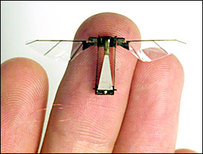Cybugs
 The Washington Post has a big package on efforts — rumored by some to already be successful — to develop next-generation flying "bugs" modeled on insects:
The Washington Post has a big package on efforts — rumored by some to already be successful — to develop next-generation flying "bugs" modeled on insects:
"I’d never seen anything like it in my life," the Washington lawyer said. "They were large for dragonflies. I thought, ‘Is that mechanical, or is that alive?’ "
That is just one of the questions hovering over a handful of similar sightings at political events in Washington and New York. Some suspect the insectlike drones are high-tech surveillance tools, perhaps deployed by the Department of Homeland Security.
Others think they are, well, dragonflies — an ancient order of insects that even biologists concede look about as robotic as a living creature can look.
No agency admits to having deployed insect-size spy drones. But a number of U.S. government and private entities acknowledge they are trying. Some federally funded teams are even growing live insects with computer chips in them, with the goal of mounting spyware on their bodies and controlling their flight muscles remotely.
Yes, it’s all a bit Scary Creepy OMG Our Government Is Evil, but it’s impossible to pretend there’s not some geek squee as well.

